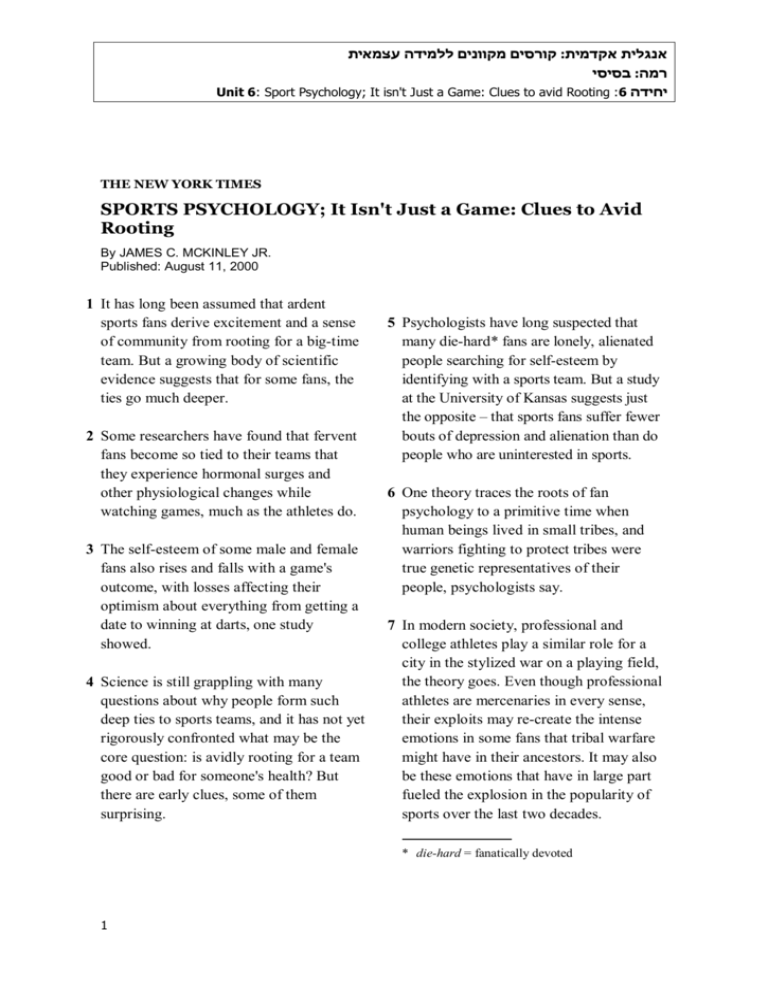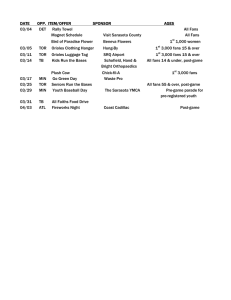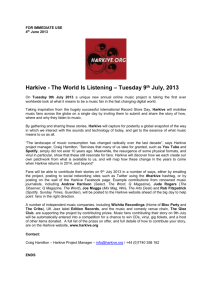PREPARING TO READ
advertisement

קורסים מקוונים ללמידה עצמאית:אנגלית אקדמית בסיסי:רמה Unit 6: Sport Psychology; It isn't Just a Game: Clues to avid Rooting :6 יחידה THE NEW YORK TIMES SPORTS PSYCHOLOGY; It Isn't Just a Game: Clues to Avid Rooting By JAMES C. MCKINLEY JR. Published: August 11, 2000 1 It has long been assumed that ardent sports fans derive excitement and a sense of community from rooting for a big-time team. But a growing body of scientific evidence suggests that for some fans, the ties go much deeper. 2 Some researchers have found that fervent fans become so tied to their teams that they experience hormonal surges and other physiological changes while watching games, much as the athletes do. 3 The self-esteem of some male and female fans also rises and falls with a game's outcome, with losses affecting their optimism about everything from getting a date to winning at darts, one study showed. 4 Science is still grappling with many questions about why people form such deep ties to sports teams, and it has not yet rigorously confronted what may be the core question: is avidly rooting for a team good or bad for someone's health? But there are early clues, some of them surprising. 5 Psychologists have long suspected that many die-hard* fans are lonely, alienated people searching for self-esteem by identifying with a sports team. But a study at the University of Kansas suggests just the opposite – that sports fans suffer fewer bouts of depression and alienation than do people who are uninterested in sports. 0F 6 One theory traces the roots of fan psychology to a primitive time when human beings lived in small tribes, and warriors fighting to protect tribes were true genetic representatives of their people, psychologists say. 7 In modern society, professional and college athletes play a similar role for a city in the stylized war on a playing field, the theory goes. Even though professional athletes are mercenaries in every sense, their exploits may re-create the intense emotions in some fans that tribal warfare might have in their ancestors. It may also be these emotions that have in large part fueled the explosion in the popularity of sports over the last two decades. * die-hard = fanatically devoted 1 קורסים מקוונים ללמידה עצמאית:אנגלית אקדמית בסיסי:רמה Unit 6: Sport Psychology; It isn't Just a Game: Clues to avid Rooting :6 יחידה 8 ''Our sports heroes are our warriors,'' 13 Studies over the last decade showed that Robert Cialdini, a professor of psychology while the run-of-the-mill* spectator may abandon a team once it starts losing, more at Arizona State, said about sports fans. committed fans ride the same emotional ''This is not some light diversion to be roller coaster as the athletes. enjoyed for its inherent grace and harmony. The self is centrally involved in Highs and Lows of Rooting the outcome of the event. Whoever you 14 In 1993 psychologists at the University of root for represents you.'' Kansas came up with a survey for measuring a fan's attachment to his team. 9 Dr. Cialdini pioneered research on fans in The scale divides fans into high, low and the 1970's. He began by documenting that moderate identification, based on their college sports fans were far more likely to responses to seven written questions. wear clothing with their team's logo on the day after victories than after defeats, a phenomenon he called ''basking in 15 A raft of studies since then has found that ''highly identified'' fans – both men and reflected glory.'' women – are not only less likely to abandon a team when it is doing poorly, 10 ''It becomes possible to attain some sort of but tend to blame their team's failures on respect and regard not by one's own officiating or bad luck rather than the achievements but by one's connection to other team's skill. They also exhibit higher individuals of attainment,'' he said. levels of physiological arousal at games, spend more money on tickets and 11 His later research showed that sports fans merchandise and enjoy generally higher tend to claim credit for a team's success, self-esteem than people uninterested in saying ''we won'' to describe a victory, but sports. tend to distance themselves from a team's failure, saying ''they lost'' when describing 16 ''It's the highly identified fans who a defeat. demonstrate this fierce connection and feel elation and dejection along with the 12 But Dr. Cialdini's initial theories did not team,'' Dr. Cialdini said. cover all spectators, because some deeply committed fans, like the long suffering souls who love the Chicago Cubs, remain 17 Gene Hamm, a 37-year-old elevator mechanic from Staten Island, says his loyal and fiercely attached to their idols despite years of failure. 1F * run-of-the-mill = ordinary 2 קורסים מקוונים ללמידה עצמאית:אנגלית אקדמית בסיסי:רמה Unit 6: Sport Psychology; It isn't Just a Game: Clues to avid Rooting :6 יחידה passion for the Mets, ignited as a boy during the 1969 season, has never been extinguished. He watches every game he can on television, his emotions rising and falling with every pitch, every hit, every managerial decision. 18 ''I actually feel myself sitting on the couch managing the team,'' he said. 19 Mr. Hamm spent months at home last year, recuperating from a job-related injury, and he said watching the Mets kept him from slipping into depression. Then Kenny Rogers walked in the winning run to seal the Atlanta Braves' victory over the Mets in the playoffs. 20 ''You don't walk in the winning run,'' he said, looking as if he had swallowed a glass of lemon juice. ''I really wish they could have won last year. That would have made me feel so much better.'' 21 Some recent studies suggest that some fans experience physiological changes during a game or when shown photos of their team. 22 A study in Georgia has shown, for instance, that testosterone levels in male fans rise markedly after a victory and drop just as sharply after a defeat. The same pattern has been documented in male animals who fight over a mate: biologists theorize that mammals may have evolved 3 this way to ensure quick resolutions to conflicts. 23 James Dabbs, a psychologist at Georgia State University, tested saliva samples from different groups of sports fans before and after important games. 24 In one test, Dr. Dabbs took saliva samples from 21 Italian and Brazilian men in Atlanta before and after Brazil's victory over Italy in soccer's 1994 World Cup. The Brazilians' testosterone rose an average of 28 percent, while the Italians' levels dropped 27 percent. 25 In another study, at the University of Utah, Dr. Dabbs and a colleague, Paul Bernhardt, found that male college basketball fans whose responses to a questionnaire indicated they had a low opinion of themselves registered the highest surges in testosterone after a victory. 26 Dr. Dabbs said in an interview that the results suggest fans empathize with the competitors to such a degree that they mentally project themselves into the game and experience the same hormonal surges athletes do. The contest, however, must be an important one, like a playoff game, he said. 27 ''We really are tribal creatures,'' he said. קורסים מקוונים ללמידה עצמאית:אנגלית אקדמית בסיסי:רמה Unit 6: Sport Psychology; It isn't Just a Game: Clues to avid Rooting :6 יחידה Physiological Arousal 33 ''It's a release,'' he said. ''You can yell and scream and do whatever. It's like therapy.'' 28 Charles Hillman, a psychologist now at the University of Illinois, found that ardent football fans at the University of 34 Edward Hirt of Indiana University has Florida experienced extreme physiological demonstrated that an ardent fan's selfarousal when they viewed pictures of esteem tends to track a team's Gator football stars making game-winning performance. plays, but responded indifferently to pictures of other athletes and teams. 35 Working with fans of Indiana University's basketball teams, Dr. Hirt showed zealous 29 "Individuals that are highly identified with fans pictures of very attractive members the team show extreme arousal compared of the opposite sex after a game and asked to the average fan,'' he said. them to rate their ability to get a date with them. 30 Among zealous male and female fans, Dr. Hillman's study found, the level of arousal 36 The results demonstrated that men and – measured by heart rate, brain waves and women who were die-hard fans were perspiration – was comparable to what the much more optimistic about their sex fans registered when shown erotic photos appeal after a victory. They were also or pictures of animal attacks, he said. more sanguine about their ability to perform well at mental and physical tests, 31 For some fans, the emotional roller coaster like darts and word games, Dr. Hirt found. of watching a game can be addictive. John When the team lost, that optimism Herde, a 65-year-old accountant in evaporated. Manhattan, has been attending Rangers games since he was a teenager and owns 37 ''People identify themselves with a team season tickets. He remembers sitting in the through thick and thin,'' he said. ''Your upper rows of the old Madison Square self-esteem will go up and down as your Garden as a boy and banging on the ceiling team does well or poorly.'' when the team scored. 38 Dr. Hirt said the desire to belong to a 32 What has brought him back to hockey group or a society – a need once fulfilled games again and again, he says, is the mostly by religious and political catharsis he feels when he gives free rein organizations – may explain why some to his anger or gloats openly in triumph. fans remain loyal despite the repeated failure of their teams. Fans of the Cubs, he 4 קורסים מקוונים ללמידה עצמאית:אנגלית אקדמית בסיסי:רמה Unit 6: Sport Psychology; It isn't Just a Game: Clues to avid Rooting :6 יחידה pointed out, have not enjoyed a World Series championship since 1908. Yet Wrigley Field sells out almost every game. Fans of the Jets present another example. 39 The team has not won a championship since 1969, when Joe Namath led the Jets to a Super Bowl. In 1985 the Jets moved from Shea Stadium in Queens to Giants Stadium in New Jersey, where they are a tenant in another team's home. He will drive only a green car. The room of his 3-year-old son, Tyler, is a shrine to the team, with footballs signed by several Jets most valuable players, a hat signed by Bill Parcells and a team jacket from 1966. 44 He says he still suffers with every loss. When Vinny Testaverde, the team's quarterback, ruptured his Achilles' tendon early in the opening game last season, Mr. Anzalone went to bed. ''I was sick to my stomach,'' he said. ''I was sick that day. I knew the year was shot.'' Keeping the Faith 40 Edward Anzalone, a New York City firefighter, said he became fascinated with the Jets when he was a boy in the 1960's, and despite 30 years without a championship, has never lost faith in the team. 41 ''It's an obsession,'' he says. ''The fans went over to New Jersey and are still hanging tough, even with no stadium and not winning a Super Bowl since 1969.'' 42 These days, Mr. Anzalone, who is 40, is better known as Fireman Eddie to Jets fans. Every game, he rides on his brother Frank's shoulders, wearing a green-andwhite fire helmet and leading the fans in a J-E-T-S chant. His devotion to the team has gained him some notoriety. 43 Mr. Anzalone's house in College Point, Queens, is painted green, the Jets' color. 5 A Sense of Belonging 45 In most cases, this deep attachment to a team can be healthy, studies have found. Daniel Wann, a psychologist at Murray State University in Kentucky, has done several studies showing that an intense interest in a team can buffer people from depression and foster feelings of selfworth and belonging. 46 In 1991 Dr. Wann studied students at the University of Kansas, demonstrating that ardent fans of basketball and baseball teams had higher levels of self-esteem and suffered fewer bouts of depression than did people who were not followers of sports. 47 ''So many of the traditional institutions are beginning to break down, religion and family,'' Dr. Wann said. ''The human psyche is the same and something has to קורסים מקוונים ללמידה עצמאית:אנגלית אקדמית בסיסי:רמה Unit 6: Sport Psychology; It isn't Just a Game: Clues to avid Rooting :6 יחידה take the place of that. Sports fills an important void.'' The New York Times, August 11, 2000. 6






